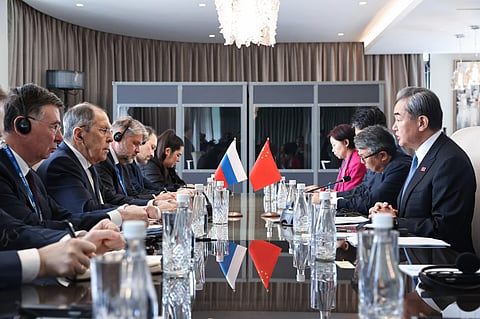

Johannesburg, February 20 – During the G20 Ministerial meeting in South Africa, Russian Foreign Minister Sergey Lavrov and Chinese Foreign Minister Wang Yi strengthened their countries' strategic partnership, presenting their alliance as a stabilizing force in a world that is becoming more polarized.
The meeting highlighted the strengthening political and economic connections between Moscow and Beijing, as both nations aim to counter Western influence in global governance. Amidst the geopolitical turmoil marked by the ongoing conflict in Ukraine, rising tensions in the Asia-Pacific, and changing alliances in the Middle East, the interaction between these two major powers had substantial implications for the international order.
One of the key points of discussion was the war in Ukraine, where China has sought to maintain a delicate diplomatic balance. Wang Yi reaffirmed Beijing’s call for a peaceful resolution, emphasizing that the root causes of the conflict must be addressed in accordance with the UN Charter. While China has presented itself as a neutral mediator, its strategic partnership with Russia suggests a broader alignment of interests. Beijing’s unwillingness to condemn Moscow’s actions outright while advocating for a diplomatic resolution reflects its nuanced approach to maintaining relationships with both Russia and the West.
Both diplomats placed special emphasis on strengthening the economic and financial mechanisms that bypass Western-dominated institutions. The G20 discussions, which focused on economic stability, provided a platform for Russia and China to further their agenda of fostering an alternative global financial framework. Their commitment to amplifying the voice of the so-called “Global Majority” - a term often used to refer to emerging economies and non-Western nations - highlights a broader effort to reshape international financial policies away from Western control.
The meeting also touched upon coordination within BRICS and the Shanghai Cooperation Organisation (SCO), reinforcing China and Russia’s push for a multipolar world order. With BRICS expanding to include new members such as Saudi Arabia, Iran, and Egypt, the bloc’s growing influence offers an avenue for both nations to challenge Western-led financial and trade systems.
Despite its strategic partnership with Russia, China remains wary of being perceived as fully aligned with Moscow’s aggressive geopolitical moves. Wang Yi’s emphasis on the UN Charter’s principles, particularly unconditional respect for human rights, serves as a diplomatic signal that Beijing is mindful of maintaining its economic and political relationships with Europe and other key global players.
China’s positioning in the Ukraine conflict is further complicated by its economic dependence on Western markets. While trade with Russia has surged - largely due to increased Chinese purchases of Russian energy - Beijing is careful to avoid overtly violating Western sanctions, ensuring that its global economic standing remains intact.
With 2025 set to feature high-level engagements between Russian and Chinese leadership, the trajectory of their partnership will be closely watched by global powers. As the two nations continue to collaborate across diplomatic, economic, and security domains, their efforts to challenge the Western-led global order are likely to intensify.
For the West, this growing alliance presents both challenges and opportunities. While the US and its allies may seek to counteract Moscow and Beijing’s influence, there is also room for diplomatic engagement - particularly in areas such as economic cooperation, climate policy, and regional stability.
The Lavrov-Wang Yi meeting at the G20 signals that Russia and China are intent on deepening their ties, presenting a united front in an increasingly fragmented world. How the West responds to this evolving partnership will shape the next phase of global geopolitics.